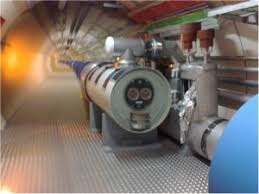Engineers from the UK-based Cockcroft Institute claim to have made discoveries that could improve the design of next generation particle accelerators.
 |
Working closely with colleagues from around the world at CERN, the North West England based team has demonstrated that it is possible to create head-on collisions of proton beams using a crab-like motion.
Work at the centre on plasma accelerators (the fifth state of matter) could be used to reduce their size by a factor of 1,000 making this technology available for new applications.
The aim is to create smaller and more affordable particle accelerators that would open up new opportunities for industry and medicine to use this technology.
Plasma accelerators use a laser to create ripples in a plasma to propel particles at speed. The Cockcroft is working on designs for a new type of accelerator based on plasma that would dramatically reduce the size and cost of accelerators.
Professor Carsten Welsch, Head of Liverpool’s Physics Department and Head of Communications for the Cockcroft Institute, writes:
“Such a plasma accelerator would be attractive for providing high-energy sources for medical and industrial applications, as well as for fundamental research studies. Medical applications could include compact light sources for patient diagnostics and treatment for example.”
Luminosity determines how many collisions take place in a particle collider per unit of time. Currently the beams in the LHC just cross over to create the opportunity for particles to collide.
To increase the statistical chances of a collision, Cockcroft scientists have contributed to experiments with a method of capturing short bunches of protons a few centimetres long and throwing them sideways to hit another bunch of protons head-on.
These ‘crab cavities’ have the potential to increase the luminosity of the LHC by a factor of ten.
Professor Welsch has worked closely with industry to coordinate a number of pan-European networks that have trained almost one hundred accelerator scientists and engineers and built capability in the partner organisations.
This activity has supported the growth of an Accelerator Cluster centred on the North West.
Professor Welsch, adds:
“Although the Large Hadron Collider at CERN is the best-known accelerator, there are over 30,000 worldwide located in clinics, universities and industrial facilities.
“Everything in the universe is made of particles and energy, so through the experiments in the LHC we are gaining a deeper understanding of the laws that govern matter, energy, space and time. It is as inspirational as the ‘space race’ for a new generation of scientists.”
The Cockcroft Institute is a collaboration between the STFC and the universities of Lancaster, Liverpool, Manchester and Stratchclyde.
Source from:electronicsweekly

 انگلیسی
انگلیسی  چینی
چینی  آلمانی
آلمانی  کره ای
کره ای  ژاپنی
ژاپنی  فارسی
فارسی  Portuguese
Portuguese  Russian
Russian  اسپانیایی
اسپانیایی 





